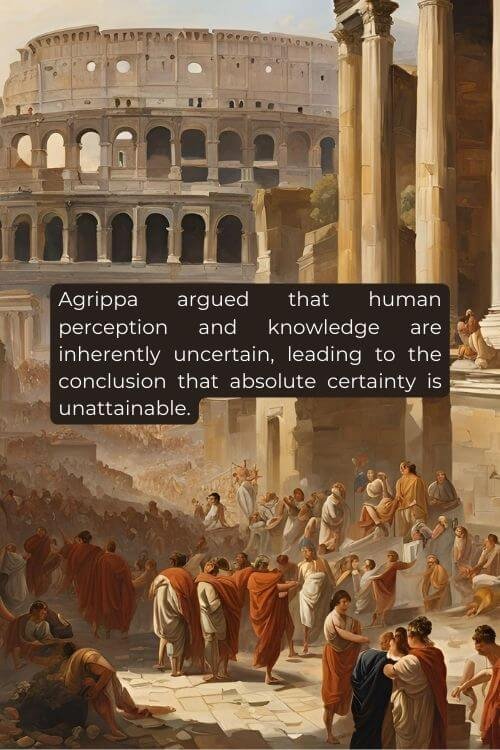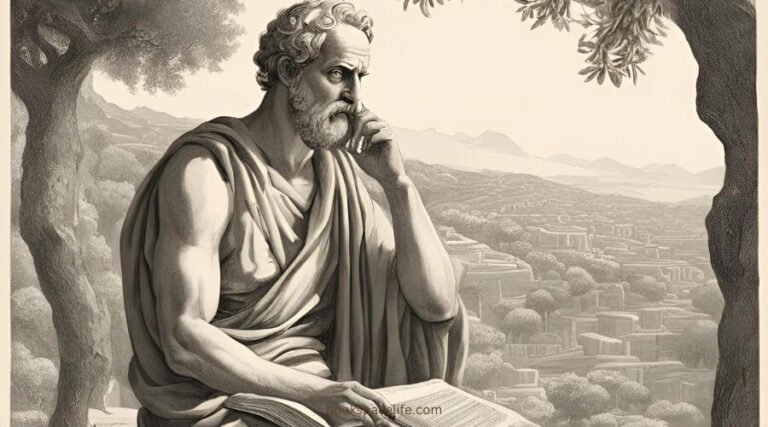Thales of Miletus
Agrippa the Skeptic: The Renaissance of Pyrrhonian Skepticism
Agrippa the Skeptic (1st century CE), a figure who lived during the 1st century CE, stands as a pivotal philosopher in the tradition of Skepticism.
Often overshadowed by more prominent philosophers, Agrippa’s contributions to the discourse on knowledge, belief, and the limits of human understanding are significant.
His ideas echo the teachings of earlier skeptics, particularly Pyrrho of Elis, and laid the groundwork for later philosophical developments.
This blog post will explore Agrippa’s life, early education, travels, philosophical contributions, and the lasting influence of his thoughts on Skepticism.
Quick Read
Table of Contents
(1) Early Life and Education
The precise details of Agrippa’s birth are shrouded in mystery, with scholars estimating he was born around c. 160 CE.
Little is known about his early life, family background, or specific place of birth. However, it is believed that he lived during a time when Skepticism was regaining prominence, particularly as a reaction against dogmatic philosophical systems.
Agrippa’s education was likely influenced by the intellectual milieu of his time, where various philosophical schools, including Stoicism, Platonism, and Epicureanism, flourished.
Agrippa is often associated with the Skeptical tradition that traces its roots back to Pyrrho of Elis, who advocated for the suspension of judgment (epoché) and the pursuit of tranquility through skepticism.
During his formative years, Agrippa may have engaged with the teachings of earlier skeptics and philosophers, possibly encountering the works of Sextus Empiricus, a key figure in the development of Pyrrhonism.
Sextus’s writings elaborated on the skeptical arguments and provided a framework for later thinkers like Agrippa to refine and expand upon.

(2) Philosophical Contributions
Agrippa’s most notable contributions to philosophy are found in his work on skepticism and his formulation of the Five Modes of Agrippa, which are arguments designed to challenge the validity of knowledge claims.
These modes serve as a systematic approach to skepticism and illustrate the fundamental tenets of Agrippa’s philosophical stance. The Five Modes can be summarized as follows:
- The Mode of Discrepancy: Agrippa argued that since people often disagree on fundamental beliefs and claims about the world, this discrepancy undermines the reliability of those beliefs. If even the most learned individuals cannot agree, then how can any belief be regarded as true? This mode highlights the inherent uncertainty of knowledge.
- The Mode of Relativity: This mode asserts that perceptions and experiences are subjective, varying from person to person. Agrippa pointed out that what one person perceives as true may differ significantly from another’s perception. This relativity further complicates the quest for objective knowledge and truth.
- The Mode of Hypothesis: Agrippa emphasized that many philosophical claims are based on unproven assumptions or hypotheses. Before accepting any belief as true, one must examine the assumptions underpinning it. If these assumptions are unfounded, then the conclusion drawn from them is also questionable.
- The Mode of Infinite Regress: Agrippa argued that any attempt to justify a belief will ultimately lead to a need for further justification. This infinite regress poses a significant challenge to the pursuit of knowledge, as it becomes impossible to establish a firm foundation for any belief system.
- The Mode of Subjectivity: This mode suggests that even if a belief could be justified, it is still contingent upon personal opinion or perspective. Knowledge is thus inherently subjective, making it difficult to arrive at universally accepted truths.
Agrippa’s Five Modes of Skepticism provide a comprehensive framework for questioning knowledge claims and emphasize the limitations of human understanding.
His work serves as a profound critique of dogmatic philosophies and invites individuals to adopt a more questioning attitude towards accepted truths.
(3) Influence and Impact
Agrippa’s contributions to Skepticism have had a lasting impact on philosophical thought, influencing both contemporaries and later generations of thinkers.
His work revived interest in the skeptical tradition and paved the way for further developments in epistemology and the philosophy of knowledge.
- Revival of Skepticism: During the Renaissance, Agrippa’s ideas experienced a resurgence as scholars sought to reconcile classical philosophy with emerging scientific thought. His arguments against dogmatism resonated with thinkers who were increasingly critical of absolute truths, leading to a broader acceptance of skeptical inquiry.
- Influence on Later Philosophers: Agrippa’s work inspired notable philosophers such as David Hume and René Descartes, who grappled with questions of knowledge and certainty. Hume’s empirical skepticism and his insistence on the limits of human reason echo Agrippa’s earlier arguments. Descartes, while attempting to establish a foundation for knowledge, confronted skepticism directly, drawing on ideas articulated by Agrippa.
- Impact on Modern Philosophy: The legacy of Agrippa’s skepticism can be seen in the contemporary philosophical landscape, where questions about the nature of knowledge, belief, and perception remain central. The challenges posed by Agrippa regarding the reliability of knowledge continue to inform discussions in epistemology and the philosophy of science.
- Cognitive Science and Psychology: Agrippa’s insights regarding the subjective nature of perception align with modern explorations in cognitive science and psychology. The understanding that individual experiences and biases shape knowledge has led to significant advancements in fields such as psychology, neuroscience, and artificial intelligence.
- Influence on Critical Thinking: Agrippa’s skepticism encourages a critical approach to knowledge claims, promoting a spirit of inquiry that is essential in education and intellectual discourse. His emphasis on questioning assumptions and seeking evidence resonates with contemporary educational practices that prioritize critical thinking and analytical skills.
- Connection to Pyrrhonism: Agrippa’s work serves as a bridge between ancient Pyrrhonism and later developments in skepticism. His adaptation of Pyrrhonian principles laid the groundwork for subsequent skeptics, preserving and revitalizing the tradition for future generations.

(4) Conclusion
Agrippa the Skeptic occupies a crucial place in the history of philosophy, particularly within the tradition of Skepticism.
His formulation of the Five Modes of Skepticism provides a rigorous framework for questioning knowledge and belief, encouraging individuals to adopt a critical stance towards accepted truths.
Through his exploration of the limits of human understanding, Agrippa invites us to embrace uncertainty and cultivate a deeper awareness of our beliefs and assumptions.
The impact of Agrippa’s work extends far beyond his time, influencing a wide array of philosophical traditions and contemporary thought.
His legacy serves as a reminder of the importance of skepticism in the pursuit of knowledge and the enduring value of questioning our beliefs.
As we navigate an increasingly complex world, Agrippa’s insights continue to inspire critical thinking and promote a deeper understanding of the nature of knowledge and belief.
His life and work embody the essence of philosophy as a tool for inquiry, encouraging us to explore the depths of our understanding and challenge the foundations of our beliefs.
(A) 7 Quick Facts on Agrippa the Skeptic
- Date of Birth – Agrippa was born around c. 160 CE, during the height of Greco-Roman philosophical thought.
- Place of Birth – He is believed to have been born in Alexandria, a major center of learning in ancient Egypt.
- Education – Agrippa studied under various philosophers, including Sextus Empiricus, gaining insights into Skepticism and rhetoric.
- Travel – He traveled extensively throughout the Roman Empire, engaging with different philosophical schools and cultural ideas.
- Skeptical Philosophy – Agrippa is known for his “Five Modes of Agrippa,” which outlines techniques for suspending judgment and emphasizing skepticism.
- Focus on Uncertainty – He argued that human perception and knowledge are inherently uncertain, leading to the conclusion that absolute certainty is unattainable.
- Legacy – Agrippa’s work influenced later philosophers and contributed to the development of Skepticism in both the ancient and modern philosophical traditions.
(B) 10 Quotes attributed to Agrippa the Skeptic
- Nothing is certain; everything is subject to doubt. Summarizing his core belief in the uncertainty of knowledge.
- We should suspend judgment on all things. Advocating for a skeptical approach to knowledge and belief.
- Differences in perception lead to differences in belief. Emphasizing that subjective experiences shape individual understanding.
- Truth is elusive, and we must accept our limitations. Acknowledging the difficulty in attaining absolute truth.
- A wise person questions even their own beliefs. Promoting self-reflection and skepticism regarding personal convictions.
- Skepticism frees the mind from the tyranny of dogma. Highlighting the liberating power of skeptical thought.
- What seems true may not be so. Cautioning against the reliability of appearances in discerning truth.
- Knowledge is not a possession but a journey. Suggesting that the pursuit of knowledge is ongoing and dynamic.
- To doubt is to think critically. Advocating for skepticism as a pathway to deeper understanding.
- Live with questions rather than answers. Encouraging an embrace of uncertainty and the complexities of life.








